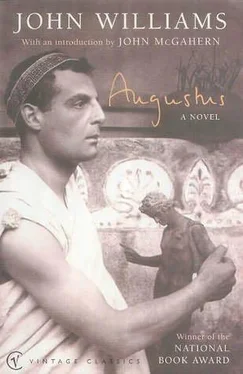John Williams - Augustus
Здесь есть возможность читать онлайн «John Williams - Augustus» весь текст электронной книги совершенно бесплатно (целиком полную версию без сокращений). В некоторых случаях можно слушать аудио, скачать через торрент в формате fb2 и присутствует краткое содержание. Жанр: Историческая проза, на английском языке. Описание произведения, (предисловие) а так же отзывы посетителей доступны на портале библиотеки ЛибКат.
- Название:Augustus
- Автор:
- Жанр:
- Год:неизвестен
- ISBN:нет данных
- Рейтинг книги:3 / 5. Голосов: 1
-
Избранное:Добавить в избранное
- Отзывы:
-
Ваша оценка:
- 60
- 1
- 2
- 3
- 4
- 5
Augustus: краткое содержание, описание и аннотация
Предлагаем к чтению аннотацию, описание, краткое содержание или предисловие (зависит от того, что написал сам автор книги «Augustus»). Если вы не нашли необходимую информацию о книге — напишите в комментариях, мы постараемся отыскать её.
Augustus — читать онлайн бесплатно полную книгу (весь текст) целиком
Ниже представлен текст книги, разбитый по страницам. Система сохранения места последней прочитанной страницы, позволяет с удобством читать онлайн бесплатно книгу «Augustus», без необходимости каждый раз заново искать на чём Вы остановились. Поставьте закладку, и сможете в любой момент перейти на страницу, на которой закончили чтение.
Интервал:
Закладка:
You understand, my dear Livy, that war is never pretty, and that one must expect a certain brutality from soldiers. But Agrippa came with Octavius into the city after the night of the plunder; and Agrippa has told me a little, though our Emperor would never speak of it.
The houses of the rich and poor were burned without discrimination or reason; hundreds of innocent townspeople, who had been guilty of nothing save the misfortune of having their town occupied by the Pompeian legions-old men, and women, and even children-were slaughtered and tortured by the troops. Agrippa told me that even in the late morning after the carnage, when he and our Emperor rode into the city, they could hear like a single sound the moan and cry of the wounded and dying.
And when our Emperor confronted Lepidus at last, after having dispatched many of his men to care for the suffering townspeople, he was so moved by sorrow that he could not speak; and poor, ignorant Lepidus, mistaking that silence for weakness and in the hysteria of what he must have conceived to be an invincible power afforded him by his sudden acquisition of the twenty-two rested and well-fed legions under his command, peremptorily ordered his colleague, to whom he spoke in contemptuous and threatening tones, to quit Sicily; and said that if he wished to remain a triumvir, he must be content with only Africa, which he (Lepidus) was willing to relinquish to him. It was an extraordinary speech…
Poor Lepidus, I have said. It was a strange delusion he had. Our Emperor did not speak in reply to Lepidus's preposterous claim.
The next day, accompanied only by Agrippa and six bodyguards, he came into the city, and went to the small Forum, and spoke to the soldiers of Lepidus and the surrendered troops of Sextus Pompeius, and told them that the promises of Lepidus were empty without his assent, and that they were in danger of putting themselves beyond the protection of Rome if they persisted in following a false leader. He had the name of Caesar, and that probably would have been enough to lead the soldiers to reason, even without Lepidus's fatal error. For Lepidus's own guard, in Lepidus's presence, made to attack the person of our Emperor, who might indeed have been gravely wounded or even killed, had not one of his guards interposed himself between the Emperor and a hurled javelin, giving his life.
Agrippa told me that as the guard fell at our Emperor's feet, a strange hush fell upon the crowd, and that even the bodyguards of Lepidus remained still and did not pursue their advantage. Octavius looked with sorrow upon the body of his fallen guard, and then lifted his eyes to the multitude before him.
He said quietly, but in a voice that carried to all the soldiers: "Thus by leave of Marcus Aemilius Lepidus, another brave and loyal Roman soldier, who offered harm to none of his comrades, is dead in a foreign land."
He had his other guards pick up the body and bear it aloft; and in front of the guard, unprotected, as if at a funeral, he walked through the crowd; and the soldiers parted before him like stalks of grain before the wind.
And one by one the legions of Sextus Pompeius deserted Lepidus, and joined our forces outside the city; and then the legions of Lepidus, despising the sluggishness and ineptness of their leader, came to our side; until Lepidus, with only a few who remained loyal to him, was helpless inside the city walls.
Lepidus must have expected to be captured and executed, yet Octavius did not move. One would have thought that in such a position he would have chosen suicide, but Lepidus did not. Rather, he sent a messenger to Octavius, and asked pardon, and asked that his life be spared. Octavius agreed, and set a condition.
Thus, on a bright chill morning in the early fall, Octavius ordered an assembly of all the officers and centurions of the legions of Marcus Aemilius Lepidus and Sextus Pompeius, and the officers and centurions of his own legions, in the Forum of Messina. And Lepidus made a public plea for mercy.
With his sparse gray hair blowing in the wind, in a plain toga with none of the colors of office, without attendants, he walked slowly the length of the Forum and mounted the platform where Octavius stood. There he knelt and asked forgiveness for his crimes, and made public relinquishment of all his powers. Agrippa has said that his face was without color or expression, and that his voice was like the voice of one in a trance.
Octavius said: "This man is pardoned, and he will walk with safety among you. No harm is to come to him. He will be exiled from Rome, but he is under the protection of Rome; and he is stripped of all his titles save that of Pontifex Maximus, which is a title that only the gods can take from him."
Without saying more, Lepidus rose and went to his quarters. And Agrippa told me a curious thing. As he was walking away, Agrippa said to Octavius: "You have given him worse than death."
And Octavius smiled. "Perhaps," he said. "But perhaps I have given him a kind of happiness."
… I wonder what his last years were like, in his exile at Circeii. Was he happy? When one has had power in his grasp, and has failed to hold it, and has remained alive-what does one become?
X. The Memoirs of Marcus A?rippa: Fragments (13 B. c.)
And we returned to Rome and the gratitude of the Roman people, whom we had saved from starvation. In the temples of the cities of Italy, from Arezzo in the north to Vibo in the south, statues of Octavius Caesar were raised, and he was worshiped by the people as a god of the hearth. And the Senate and the people of Rome made to be erected in the Forum a statue of gold, in commemoration of the order that had been restored to sea and land.
To celebrate the occasion, Octavius Caesar remitted the debts and taxes of all the people, and gave them assurance of final peace and freedom when Marcus Antonius had subdued the Parthians in the East. And upon my own head, after giving thanks to Rome for its steadfastness, he placed the crown of gold adorned with images of our ships. It was an honor given to no one before and to no one since.
Thus while Antonius in the distant East hunted the barbarian Parthian tribes, in Italy Caesar Augustus devoted himself to securing the borders of his homeland, neglected by the many years of dissension in which it had suffered. We conquered the Pannonian tribes and drove the tribal invaders from the coast of Dalmatia, so that Italy was secure from any threat from the north. In these campaigns, Octavius Caesar himself led his troops, and received honorable wounds in the battles.
CHAPTER SIX
I. Letters: Nicolaus of Damascus to Strabo of Amasia, from Antioch and Alexandria (36 B. c.)
My dear Strabo, I have witnessed an event, the significance of which only you, the dearest of all my friends, will apprehend. For on this day Marcus Antonius, triumvir of Rome, has become Imperator of Egypt-a king in fact, though he does not call himself such. He has taken in marriage that Cleopatra who is the Incarnate Isis, Queen of Egypt, and Empress of all the lands of the Nile.
I give you news that, I suspect, none of Rome has heard yet, possibly not even that young ruler of the Roman world of whom you have so often written and whom you so admire; for the marriage was sudden, and known even to this Eastern world only a few days before the actual event. Oh, my old friend, I would almost relinquish some part of that wisdom toward which we both have so laboriously striven, if I could but see the look upon your face at this moment! It must be one of surprise-and a little chagrin? You will forgive one who chides and teases you; I cannot resist provoking what I hope is a friendly envy in one whose good fortune in the world has provoked the same in me. For you must have known that your letters from Rome have raised that envy in me. How often in Damascus did I wish that I was with you there, in the "center of the world," as you have called it, conversing with the great men you mention with such frequency and such intimacy. Now I, too, have come into the world; and by a stroke of good fortune, which I still cannot quite believe, I have secured a most remarkable position. I am tutor to the children of Cleopatra, master of the Royal library, and principal of the schools of the Royal household.
Читать дальшеИнтервал:
Закладка:
Похожие книги на «Augustus»
Представляем Вашему вниманию похожие книги на «Augustus» списком для выбора. Мы отобрали схожую по названию и смыслу литературу в надежде предоставить читателям больше вариантов отыскать новые, интересные, ещё непрочитанные произведения.
Обсуждение, отзывы о книге «Augustus» и просто собственные мнения читателей. Оставьте ваши комментарии, напишите, что Вы думаете о произведении, его смысле или главных героях. Укажите что конкретно понравилось, а что нет, и почему Вы так считаете.











